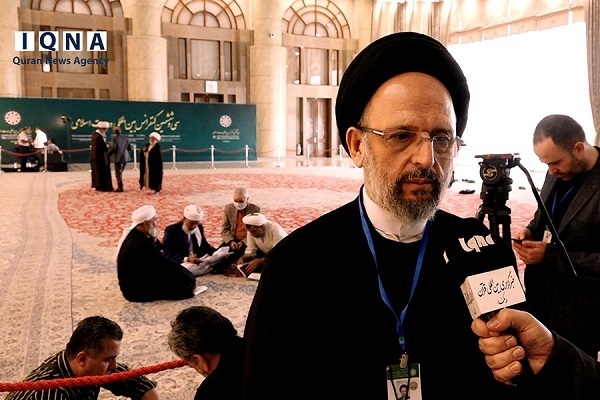AhlulBayt News Agency: A senior Lebanese Shia cleric said the path to Islamic unity and proximity goes through focusing on common grounds among Islamic schools of thought and abandoning issues that provoke tensions.
Sayed Ali Fadlallah, the Friday prayer leader of a major mosque in the Lebanese capital of Beirut, said unity and proximity do not mean moving toward one school or Sunnis becoming Shias or vice versa.
Those who strive to promote Islamic unity want to highlight the common grounds and encourage Muslims to focus on them instead of only seeing the differences, he said.
The cleric noted that the common grounds between Shia and Sunni Muslims are numerous, adding that it has been shown in all of the books published by the World Forum for Proximity of Islamic Schools of Thought (WFPIST).
The role of the WFPIST is to portray an image that brings Muslims closer together, he stated.
Fadlallah underlined that dialogue is made possible when the commonalities are highlighted and that dialogue can reduce the distances.
He referred to the efforts for strengthening Muslim unity, including those by the WFPIST, and such efforts should be strengthened and supported because there are plots hatched by the enemies to foment discord and provoke tensions in the Islamic Ummah.
The cleric also stressed the need for remaining committed to Islamic values in order for realization of Muslim unity.
He further described the issue of Palestine and enmity with the Zionist regime of Israel as a cause for unity in the Islamic world.
The Zionist regime is targeting all of the Muslim world, seeking to destroy it, he said, adding that it is therefore necessary to be vigilant in confrontation with this enemy.
/129
Sayed Ali Fadlallah, the Friday prayer leader of a major mosque in the Lebanese capital of Beirut, said unity and proximity do not mean moving toward one school or Sunnis becoming Shias or vice versa.
Those who strive to promote Islamic unity want to highlight the common grounds and encourage Muslims to focus on them instead of only seeing the differences, he said.
The cleric noted that the common grounds between Shia and Sunni Muslims are numerous, adding that it has been shown in all of the books published by the World Forum for Proximity of Islamic Schools of Thought (WFPIST).
The role of the WFPIST is to portray an image that brings Muslims closer together, he stated.
Fadlallah underlined that dialogue is made possible when the commonalities are highlighted and that dialogue can reduce the distances.
He referred to the efforts for strengthening Muslim unity, including those by the WFPIST, and such efforts should be strengthened and supported because there are plots hatched by the enemies to foment discord and provoke tensions in the Islamic Ummah.
The cleric also stressed the need for remaining committed to Islamic values in order for realization of Muslim unity.
He further described the issue of Palestine and enmity with the Zionist regime of Israel as a cause for unity in the Islamic world.
The Zionist regime is targeting all of the Muslim world, seeking to destroy it, he said, adding that it is therefore necessary to be vigilant in confrontation with this enemy.
/129

